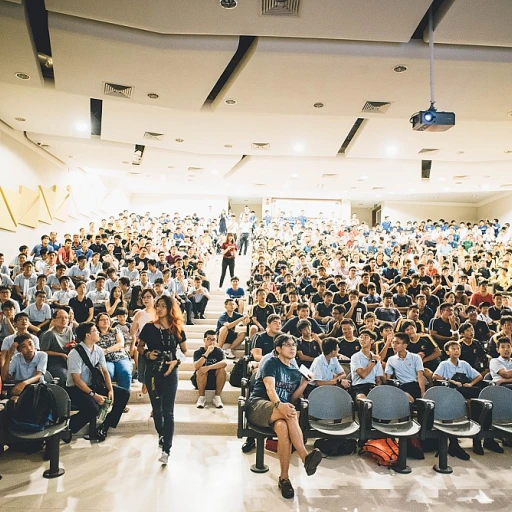
The Role of Technology in Modern Hiring
The Intersection of Digital Technologies and Hiring Practices
In today's competitive market, technology has transformed how organizations approach hiring. It plays a crucial role in streamlining recruitment processes, enhancing both employee engagement and organizational performance. Leaders in companies are increasingly relying on digital tools to optimize hiring practices, which are crucial for a successful business transformation. Organizations are leveraging technologies such as artificial intelligence and machine learning to sift through large volumes of candidate data, ensuring a more thorough and efficient selection process. This digital era allows businesses to make data-driven decisions, a significant improvement over traditional methods known for their subjectivity and inefficiency. By utilizing automated systems, companies can focus on candidates who align well with their organizational culture and performance objectives. Technologies such as AI can perform initial screenings, assess resumes, and even conduct basic interviews, freeing up valuable time for human resource professionals to focus on other tasks. This technological role not only reduces time-to-hire but also ensures that candidates who progress possess the required qualifications and are likely to meet employee performance expectations. As digital transformation becomes more prevalent, organizations are witnessing an overhaul in their hiring processes, reducing costs and increasing efficiency. It's essential to consider the impact of these technologies on remote work and the broader organisational performance. With the right strategies, companies can harness these advancements to benefit their overall recruitment outcomes. To navigate the challenges that come with implementing these digital technologies in hiring, organizations can refer to navigating change management for insights into adapting to these new processes effectively.Streamlining Recruitment with AI and Automation
Implementing AI for Efficient Talent Acquisition
In today's fast-paced hiring environment, organizations are leveraging technology to enhance their recruitment processes. AI and automation are playing pivotal roles in transforming how companies identify and attract the right talent, ultimately boosting organizational performance.
One of the key advantages of using AI in hiring is its ability to process large volumes of data quickly and accurately. AI-driven tools scan through resumes, triage applications, and identify top candidates more efficiently than manual efforts ever could. This digital transformation not only streamlines the employee hiring process, reducing time and cost, but also supports data-driven decision making by providing insights into talent pools.
Automation in recruitment also supports improved candidate experience. Automated communication systems keep applicants updated on their status, ensuring they remain engaged and informed, without overburdening HR teams. Furthermore, integrating AI with enhancing efficiency in HR management aids companies in maintaining a dynamic and responsive candidate pipeline that aligns with their organizational culture.
Enhancing the Role of AI in Organizational Strategies
AI's capabilities extend beyond just accelerating the hiring process. It provides strategic insights that can be instrumental for business leaders making informed decisions about workforce planning and development. For instance, AI tools can help predict future talent needs by analyzing current hiring trends and turnover statistics. This empowers leaders to proactively address skills gaps and build a workforce that aligns with future business objectives.
Furthermore, the integration of AI in recruitment reinforces the importance of digital leadership. Organizations must embrace this transformation by adapting their management approaches to foster a culture that supports continuous learning and innovation among employees. Therefore, AI not only enhances employee performance and engagement but also strengthens overall performance organizational outcomes.
Enhancing Candidate Experience through Digital Platforms
Improving Applicant Journey with Tech Innovations
The integration of digital platforms into the hiring process has been transformative for organizations aiming to enhance their candidate experience. Digital tools support a seamless recruitment process that aligns with the strategic objectives of modern business environments. By leveraging these technologies, companies can foster a positive organizational culture that prioritizes both employee engagement and organizational performance.
One of the most significant benefits of digital platforms in recruitment is the ability to provide a more personalized and engaging experience for candidates. This personalization is not only a reflection of the organization's commitment to technological transformation but also a testament to its leadership's focus on creating an employee-centric culture. Candidates now expect communication and interaction that mirror the efficiencies of the digital era.
- Streamlined Application Process: Utilizing digital tools, organizations can create a streamlined application process that improves efficiency and reduces the time to hire. This not only enhances the candidate journey but also supports quicker, data-driven decision making.
- Enhanced Communication: Automated messaging systems and chatbots allow companies to maintain communication at every stage of the hiring process, boosting candidate satisfaction and keeping engagement levels high.
- Transparency and Feedback: Organizations can leverage digital platforms to provide consistent feedback and transparency throughout the hiring process, addressing one of the main challenges in tech-driven recruitment.
These technological advancements not only improve the overall recruitment process but also ultimately drive higher levels of employee performance once new hires are integrated into their roles. By aligning hiring strategies with digital innovations, companies position themselves as industry leaders in creating strong, sustainable organizational performance through exceptional candidate experiences.
Data-Driven Decision Making in Hiring
Leveraging Data for Optimal Hiring Choices
In the hiring landscape, the integration of data-driven decision making has emerged as a pivotal factor driving effective recruitment strategies. In the current digital era, companies are increasingly reliant on data to make informed decisions that maximize employee performance and bolster organizational performance.
One of the core benefits of data-driven approaches is the ability to analyze vast volumes of information collected through digital technologies. This includes examining candidates’ qualifications, work history, skill sets, and cultural fit with the organization. By correlating these data points, companies can pinpoint candidates who not only meet the job requirements but also align well with the organisational culture.
Moreover, data analytics plays a vital role in identifying employee engagement trends and retention patterns. Digital tools equipped with artificial intelligence can predict a candidate's potential performance and longevity in a company, allowing leaders to make strategic choices in hiring to ensure lasting success.
It's not just about understanding past employee performance—it's about anticipating future potential. Through advanced analysis, organizations can tailor their recruitment strategies to adapt to shifts in the market, aligning with digital transformation initiatives. In turn, this ensures they attract top talent capable of navigating the challenges of a rapidly evolving business environment.
However, integrating these technologies requires digital leadership and an adaptable management approach. Organizations must equip their leadership teams with the necessary tools and knowledge, ensuring that they can harness this data effectively.
Ultimately, the key to transforming hiring practices lies in the strategic application of data insights. As organizational priorities shift towards performance and innovation, data-driven decision making becomes a crucial component in empowering companies to thrive in today’s competitive landscape.
Overcoming Challenges in Tech-Driven Hiring
Addressing the Complexities of Tech-Driven Hiring
While technology has revolutionized the hiring process, it also presents unique challenges that organizations must navigate to maintain optimal performance. As companies increasingly rely on digital tools and artificial intelligence, they must also be prepared to address the complexities that come with these advancements.
Balancing Automation with Human Touch
One of the primary challenges in tech-driven hiring is finding the right balance between automation and the human touch. While AI can streamline recruitment processes, it can also lead to a lack of personal interaction, which is crucial for assessing cultural fit and employee engagement. Organizations need to ensure that their digital transformation strategies incorporate elements that preserve the human aspects of hiring.
Data Privacy and Security Concerns
With the increased use of data-driven decision making, companies must prioritize data privacy and security. The integration of digital technologies in hiring processes means handling vast amounts of personal data, which can pose significant risks if not managed properly. Leaders must implement robust data protection measures to safeguard both organizational and candidate information.
Ensuring Fairness and Reducing Bias
Another challenge is ensuring fairness in hiring practices. While AI and digital tools can enhance efficiency, they can also perpetuate existing biases if not carefully monitored. Organizations must work towards creating algorithms that promote diversity and inclusion, aligning with transformational leadership goals to foster an equitable organizational culture.
Adapting to Rapid Technological Changes
The rapid pace of technological advancement means that organizations must continually adapt to new tools and platforms. This requires ongoing investment in digital leadership and training to keep up with the latest trends and maintain a competitive edge in the digital era. Companies must be proactive in updating their strategies to leverage new technologies effectively.
In conclusion, while technology offers significant benefits for enhancing organizational performance, it also requires careful management to overcome its challenges. By addressing these issues, organizations can harness the full potential of digital transformation in their hiring processes.
Future Trends in Technology and Hiring
Emerging Directions in the Hiring Process
As organizations continue to adapt to the digital era, it is crucial to stay updated with future trends in technology that can optimize the hiring process. Here are some significant developments we can expect to see:- Increased Use of Artificial Intelligence (AI): The role of AI in recruitment will expand beyond automation and candidate screening to include sentiment analysis and predicting employee engagement. As digital technologies advance, companies can refine these tools to identify candidates who are more likely to thrive in their organizational culture.
- Remote and Hybrid Work Models: With the shift to remote work, technology will play a vital role in supporting organizational performance and employee productivity. Digital tools will facilitate seamless communication, collaboration, and performance monitoring, thus reshaping the traditional workplace setting.
- Advanced Data Analytics: Leveraging data-driven decision-making processes will continue to transform how organizations select candidates. Data analytics can provide insights into candidate performance and suitability, thereby increasing the effectiveness of the recruitment process.
- Integration of Cross-Platform Technologies: The amalgamation of different digital platforms will enable a more cohesive hiring experience. Organizations will benefit from technologies that provide comprehensive views of candidate profiles and performance metrics.
- Focus on Employee Performance and Engagement: Companies will increasingly use digital technology to enhance employee performance and foster engagement. Technologies that offer real-time feedback can help bridge the gap between leadership and employees, cultivating a stronger organizational culture.
- Emphasis on Digital Leadership: As digital transformation becomes more ingrained in companies, leaders will need to adapt to digital leadership strategies. This shift will require management to be adept in using advanced technologies to enhance employee and organisational performance.













